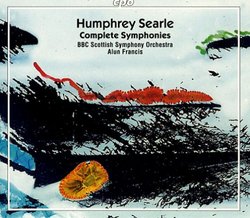| All Artists: Humphrey Searle, Alun Francis, Glasgow BBC Scottish Symphony Orchestra Title: Humphrey Searle: Complete Symphonies Members Wishing: 0 Total Copies: 0 Label: Cpo Records Release Date: 4/5/2005 Genre: Classical Style: Symphonies Number of Discs: 2 SwapaCD Credits: 2 UPC: 761203713127 |
Search - Humphrey Searle, Alun Francis, Glasgow BBC Scottish Symphony Orchestra :: Humphrey Searle: Complete Symphonies
 | Humphrey Searle, Alun Francis, Glasgow BBC Scottish Symphony Orchestra Humphrey Searle: Complete Symphonies Genre: Classical |
Larger Image |
CD Details |
CD ReviewsValuable Reissues at Budget Price J Scott Morrison | Middlebury VT, USA | 04/17/2005 (4 out of 5 stars) "These fine performances by Alun Francis and the BBC Scottish Symphony Orchestra of Humphrey Searle's symphonies have been previously issued by this label (cpo) at full price. It is indeed fortunate that they are boxed together at budget price, with the original booklets for the two previous single-CD issues, each with informative notes by David Sutton-Anderson, because Humphrey Searle's music has been ignored for nigh-on fifty years. In his time he was considered one of the best of the mid-century orchestral composers, certainly among those working in England, and to my ears they stand up to close scrutiny after all this time. I recommend that you go to the listing of the single CDs still listed here at Amazon so that you can read the full reviews of these works by new-music maven, Edward Wright. I simply could not improve on what he has written about the music itself, and particularly his comments on the procedures used by Searle in the five symphonies. Also included here are his Night Music, Op. 2, dedicated to his teacher, Anton von Webern, and sounding for all the world like an expansion on Webern's epigrammatic music, as well as the Overture to a Drama, Op. 17. But the important works here are the symphonies. Searle (1915-1982) always called himself a 'romantic' and indeed these symphonies are romantic in intent, although their musical language is that of the Second Viennese School. Among the five symphonies there are some obvious differences: the Second is probably the easiest to understand and respond to the first time through, being more nearly tonal than the others; the Fourth is the most austere and forbidding, but its dramatic arc is such that one feels carried along in some sort of narrative, although it is not clear what that might be (if indeed a narrative is intended). Its conclusion is apocalyptic in thrust.
I am not typically one who seeks out atonal or serial works, but there are some that are fairly immediately attractive to me and which I find repay repeated listening. That is the case here with all five symphonies -- it is less so with the two shorter works included; indeed I find 'Night Music,' although clearly accomplished, to be rather off-putting -- including the stark Symphony No. 4. On reflection there are at least a couple of reasons why this should be the case: Searle's use of rhythm and meter is unfailingly interesting particularly as it is used to further the dramatic arc of the work in question, and I find his orchestration to be an inventive and seemingly inevitable, rather than pasted-on, aspect of his structural processes. The BBC Scottish Symphony, although competent, is not the suavest of orchestras. One wonders how this music would sound played by, say, the Chicago Symphony or Cleveland Orchestra under Boulez or von Dohnányi. Chances are we won't ever know, so I'd suggest anyone who finds themselves interested to sample this music would do well to buy this reasonably cheap issue. TT=112:52 Scott Morrison" |
